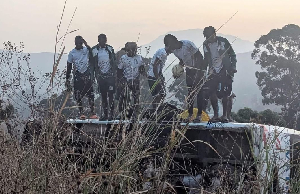Apparently frightened by the latest developments and the decisive direction the Southern Cameroons independence struggle is taking, the Yaounde authorities have instructed the Cameroon embassy in Brussels, Belgium not to issue visas to members of the Unrepresented Nations and Peoples Organisation, UNPO, who were expected in Cameroon in the days ahead.
A highly-placed source within the SCNC who announced the development to The Guardian Post has qualified government’s decision to refuse giving visas to the UNPO delegation members as shameful. He said, “ I thought that for once, the Biya regime would pretend that there is freedom of gathering in Cameroon by allowing the UNPO delegation entry in Cameroon…
If they did this, it would have gone a long way to reverse the international opprobrium which Cameroon has suffered since the introduction of multi-party politics’’.
It should be recalled that the UNPO delegation was not only coming to Cameroon to condole with the family of the late SCNC national chairman, Chief Ayamba Ette Otun but also to get first-hand information on the problems being faced by Anglophones in Cameroon.
The delegation’s first stop-over was to be in Mamfe where they were expected to condole with Chief Ayamba’s family before undertaking a tour of the Southern Cameroons territory to live the true picture of Anglophones.
They had also planned to get testimonies from aggrieved Anglophones which would have been used by the UNPO to strengthen the Southern Cameroons’ independence struggle. SCNC activists were already mobilizing to give the UNPO delegation a red carpet reception.
But while SCNC activists are crest-fallen that the UNPO delegation would no longer make the Cameroon trip, a sympathizer of the movement, Yembe Martin rather sees it as a blessing in disguised: ‘’It is a good thing for the SCNC that the Biya regime has blocked the UNPO delegation from getting to Mamfe to condole with Chief Ayamba’s family and then later make a tour of the Southern Cameroons’ territory...the Yaounde authorities have not only inadvertently given the SCNC publicity but have reported themselves to international bodies as being a truly repressive regime…’’
It should be recalled that when news of Chief Ayamba’s death was made public, the UNPO head office in Brussels issued a condolence statement which read in part: ‘’…the UNPO presidency, secretariat and members would like to express their sincerest condolences to Chief Ayamba’s family, friends and the people of Southern Cameroons…Mr. Ayamba Ette Otun dedicated his life to protecting and promoting the rights of the Southern Cameroons.
His activism for the right to self-determination has been relentless…he had vowed never to shave his beard until the Southern Cameroons is completely free. With the passing away of Chief Ayamba, the Southern Cameroons movement for self-determination has lost a great leader. The UNPO stands with the people of Southern Cameroons in this difficult moment and hopes the legacy of Chief Ayamba may inspire many…’’
About the UNPO The UNPO, it must be said, is a movement whose main objective centres on drawing attention to issues affecting marginalized groups at the United Nations. For its over twenty years of existence, the UNPO’s key action plan has been to ensure that it members are able to effectively access and take part in the discussions of international bodies mandated to protect their rights.
Membership to the UNPO where the Southern Cameroons is also a member is open to all nations and peoples who are not adequately represented at the United Nations. Prospective members have to be a nation or a people, possessing the will to be identified as a nation or a people and are bound to a common heritage which can be historical, racial, ethnic, religious or territorial.
The prospective participant can also be a section of a people, constituting a minority, living on a portion of its ancestral territory, incorporated into a state other than a state represented by that people.
Actualités of Thursday, 14 August 2014
Source: The Guardian Post Newspaper
Gov't refuses visas to UNPO delegation













